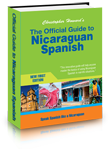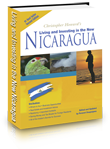by: Richard L. White
Nicaragua, an incredibly beautiful nation of gentle, peace-loving people, has shaken away the ghosts of a civil war that ended 15 years ago, and is now beckoning to the world as a "go-to" destination of strategic importance. The past nine months have been a "tipping point" of global recognition of these changes.
In short, Nicaragua is easily accessible, safe, attractive and inexpensive, and investment opportunities are timely.
Nicaraguan officials, backed by voters, have driven these changes. The World Bank, the International Monetary Fund and participating nations of the Central American Free Trade Agreement have added their affirmations by making sweeping decisions strengthening Nicaragua's comeback.
From my personal perspective, no United States city has done more to assist Nicaragua than Pittsburgh. For example, when its capital city of Managua was devastated by the Christmas 1972 earthquake, one of Pittsburgh's own baseball superstars, Roberto Clemente, lost his life trying to fly life-saving supplies to the city.
When Violeta Barrios de Chamorro -- the first democratically elected chief executive in Nicaragua's history -- became president of the country in 1990, she reached out to many friends here. She appointed me as an honorary consul representing Nicaragua in the Western Pennsylvania/Midwest region.
In 1992, I was part of a delegation of distinguished Pittsburgh educators, medical professionals and business leaders who went to Nicaragua at her invitation. The group advised Chamorro on how to strengthen international ties in industry, education, health care and business.
Tourism, agricultural exports and free trade zones were identified as the best opportunities for growth.
Since then, Pittsburghers have maintained steady support. Duquesne University obtained grants to upgrade Nicaraguan health-care facilities, established a nursing exchange program and, with Carlow College and the University of Pittsburgh, granted scholarships to many students who have returned to Nicaragua and now hold leadership positions.
The Pittsburgh Rotary Club, along with local foundations and corporate support combined with significant Nicaraguan assistance, has established two Roberto Clemente Health Clinics serving the poor in rural regions. The first opened in LaReforma in 1998, and the second in Limon Uno was dedicated in July. Pittsburgh-based Global Links and Brothers' Brother have sent substantial health-care equipment, medicines and supplies for more than a decade.
Today, many Pittsburghers are doing business in Managua and are bullish about the future. Among them, an investor group is developing a worldclass oceanfront hotel and golf course community. Some background:
Turnaround. What has Nicaragua done to produce such profound change? For one, the democratic process rules the country. Since 1990, voters have turned out in record numbers to vote in three consecutive democratic presidential elections leading to peaceful transfers of power. The police force has been professionalized and is controlled by civilians. The army has been reduced from more than 100,000 troops to about 7,000. Elected leaders have developed realistic budgets, instituted tax reforms and restructured underperforming banks and domestic debt.
Global markets and media have taken notice. The IMF and World Bank forgave a staggering $4.5 billion in Nicaraguan debt this year. Japan agreed in June to write off an additional $118 million. As well, CAFTA-- the landmark U.S.-Central American Free Trade Agreement reached last year - - will lower tariffs and other trade barriers. Major news outlets are singing the nation's praises.
Easy Access. Recently, the Chicago Tribune observed that Nicaragua was a "beautiful and peaceful place now courting tourism." U.S. News & World Report has trumpeted: "Nicaragua is a hot new travel destination."
In 2003, tourism generated revenues of $150 million, and foreign arrivals increased 10.9 percent from 2002. American Airlines, Continental Airlines and TACA (based in El Salvador) make 10 flights daily between Managua and Miami, Houston and Los Angeles. Major cruise lines stop at San Juan del Sur. Holiday Inn, Inter-Continental Hotels, Best Western, the Seminole Hotel and Princess have opened hotels.
Retirees are flocking to Nicaragua. The Wall Street Journal recently wrote: "As legions of baby boomers prepare to retire and relocate to warmer climates, a widening range of Central American countries are vying to be their new home. ... As a result, a new breed of intrepid retirees is branching out to countries including ... Nicaragua."
Safety. A study by INCAE, the Harvard Business School affiliate in Managua, shows that Nicaragua is the safest country, and Granada is one of the safest cities, in all of Central America. The New York Times observed this spring, "Unarmed, crisp-shirted policemen have replaced battle-weary soldiers patrolling the streets."
Stunning Beauty. Nicaragua boasts of spectacular natural and manmade beauty. Founded in 1524, Spanish colonial Granada is the oldest city in the Western Hemisphere. Freshwater Lake Nicaragua is the 10th-largest lake in the world, and large volcanoes dot the landscape. Cloud forests, howler monkeys and exotic species of flora and fauna exist just minutes from Managua.
Inexpensive Living. Property in Nicaragua is much less expensive than in the United States, and labor costs are low. The Christian Science Monitor recently noted that Nicaragua "is emerging as a U.S. retirement haven. ... Cheap land surrounds picturesque crater lakes and active volcanoes. And the cost of living is a fraction of what it is in the United States." Foreigners can become residents and acquire fee simple title to property.
Timely Opportunities. Active investment is stimulating growth. Since instituting free market reforms in 1991, Nicaragua has privatized more than 350 state enterprises and reduced inflation from 13,500 percent to single-digits.
Major corporations have established local operations, including McDonald's, Liz Claiborne, TGI Fridays, Osh Kosh B'gosh, Payless Shoes, Kodak, United Colors of Benetton, Burger King, Radio Shack, Pizza Hut, Domino's, Hertz, Budget and Alamo.
Government incentives also are stimulating growth. The Tourism Tax Incentives Law is being used by Nicaraguans to invest in certified tourism development projects as an offset of what they would have paid in ordinary income tax.
(Richard L. White, Ph.D., of Adams, is honorary consul representing Nicaragua; retired president of Bayer Corp.'s fibers, additives and rubber division in Pittsburgh; and former Duquesne University board chairman.)




